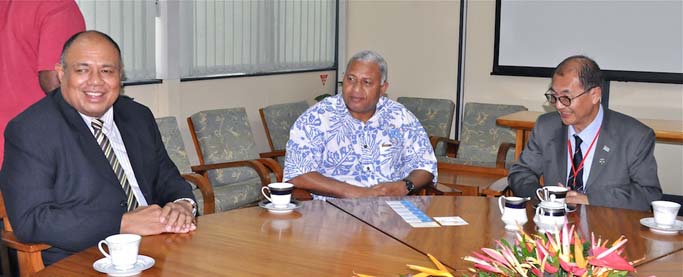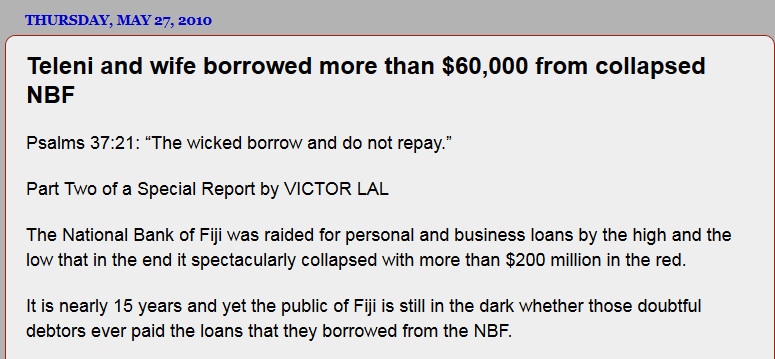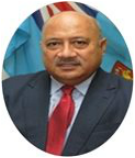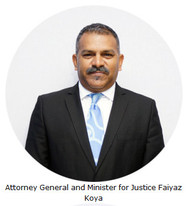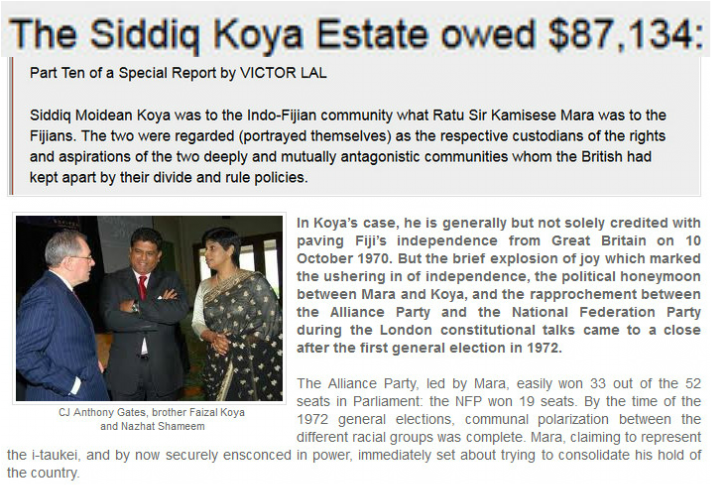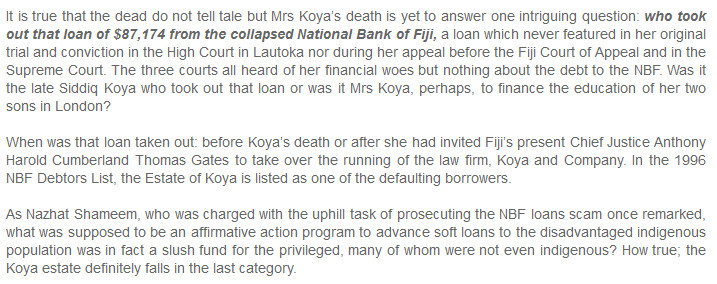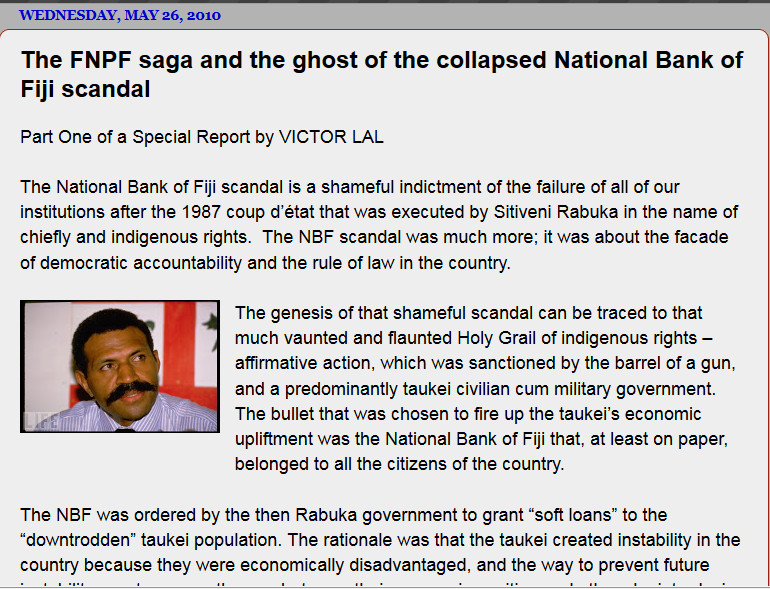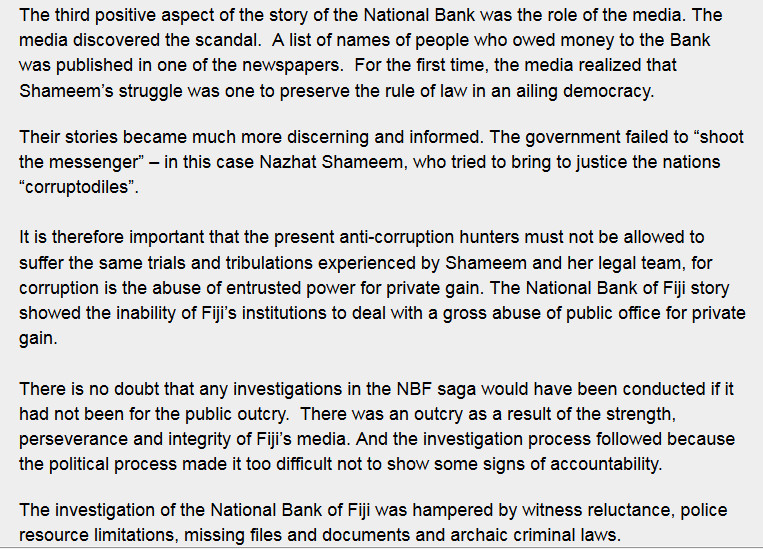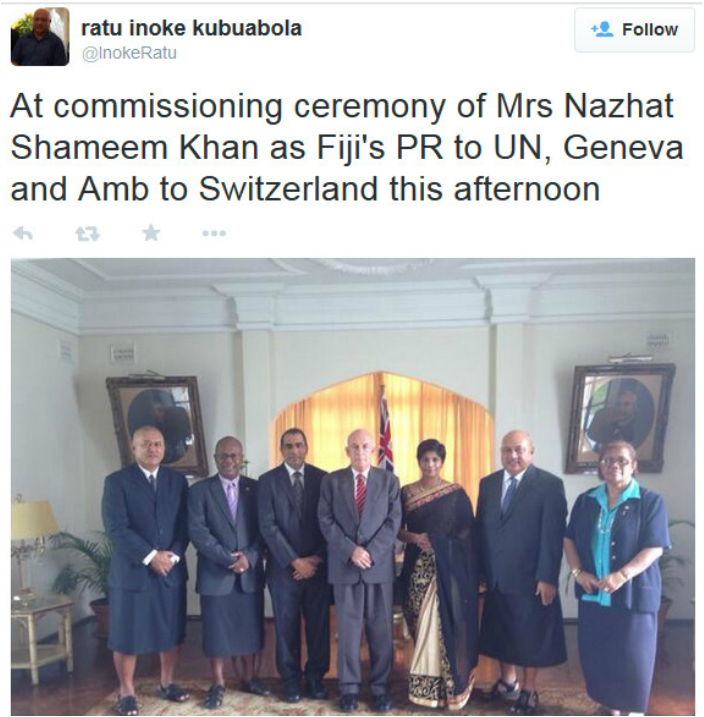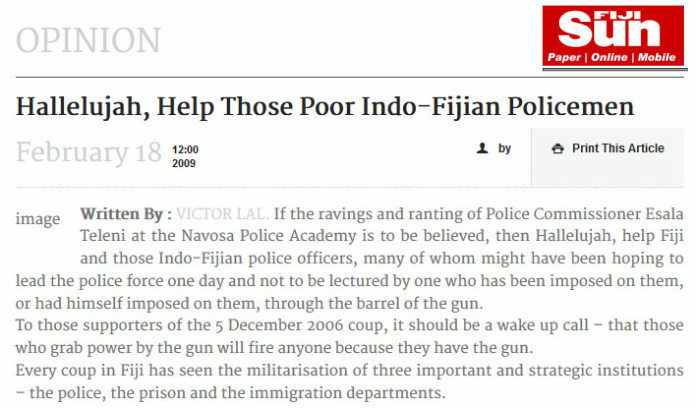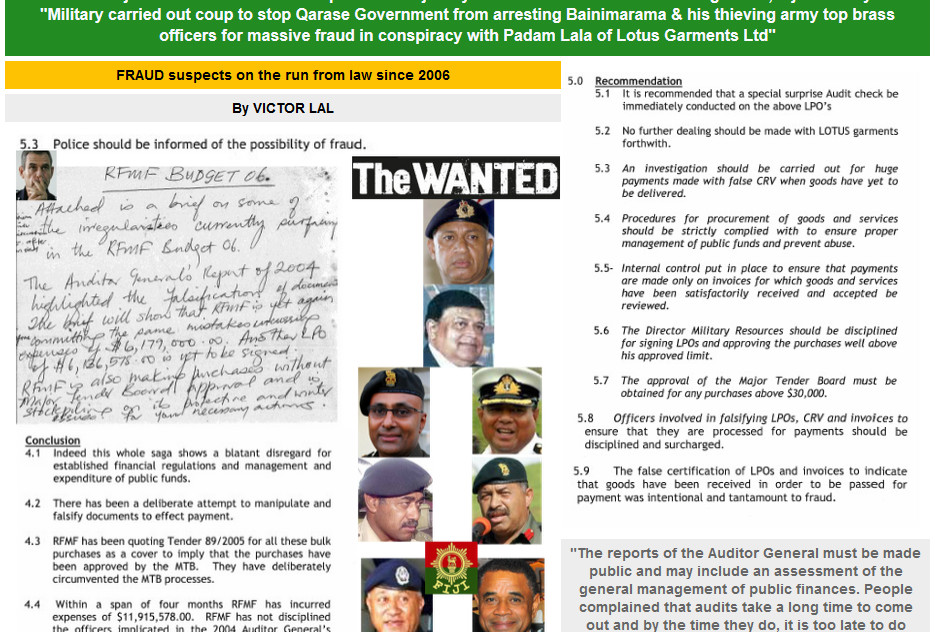Teleni, Fiji's former Ambassador to China, was recalled last November following the bribery charges; Foreign Minister Kubuabola pleaded with Bainimarama to give Teleni a "second chance"; he was last December appointed as Special Adviser to the Pacific Islands Development Forum
Fijileaks Editor: Both serial coupists Kubuabola and Teleni were also part of the debtors responsible for the collapse of the National Bank of Fiji:
Bainimarama warns voters against politicians and hangers-on responsible for the infamous National Bank of Fiji (NBF) scandal: “Now, some of those same politicians and hangers-on who were responsible for this scandal – and others who benefited personally – are seeking your vote in the forthcoming general election. They are relying on you having short memories. They are treating you as if you are stupid. I urge you to call their bluff and consign them to the political dustbin of history. With their noses stuck firmly in the trough, this elite – aided by a grossly irresponsible management and board – raided the National Bank of Fiji for loans that many had no intention of repaying. They ripped off their fellow Fijians...The funds of ordinary Fijians were misappropriated.
These elites effectively robbed their own countrymen and women – decent, hardworking ordinary people who had put their trust in the Bank and the Government.”
Co-Coupster with Rabuka, NBF Debtor, to Foreign Minister - now Overlord of former DPP turned Diplomat Nazhat Shameem, once tasked with bringing to trial the likes of Kubuabola for swindling collapsed National Bank of Fiji - Of course he remains a fugitive from the long arm of the law-for COUPS have been his Shield Against the Sword of Justice! Ironically, Kubuabola, as Minister for Foreign Affairs, overruled Khaiyum who had vigorously objected to Shameem's appointment to Geneva!
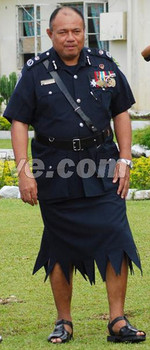
This is achieved by placing at the command of the three institutions, military men in civilian clothes. In Fiji, it is spiced up with the claim that the appointments were made by the President of Fiji.
According to Fiji Television, negative media reports about the police-led Christian crusade against crime had prompted Teleni’s lecture to the Indo-Fijian police officers. The Fiji TV report captured the police chief saying: “If you are with me, you stay, if not you get out. If you get through that door, get out of the organisation. Kemudou tamata liu muri (you people are not loyal). I don’t know what’s wrong with you people. Either you come with me and take this organisation forward or you get out. Only lamulamu people (cowards) will go to the press. That will not solve the problem. I have a list of people. I’m going to start terminating their services. I am not hesitant to do that. I can sack everyone here sitting here today and I can recruit another 200 Indian officers today. I have no problems to do that. Fiji TV, Fiji Sun, Fiji Times will not help you. Let me remind you that any other Indian officers will not help you. Commissioner will help you.”
Fiji TV claimed that Teleni suggested that he had names of those who had been running to the media with their grievances and threatened that heads could roll.
Who can blame Teleni, for he made a telling admission: “I can sack everyone here sitting here today and I can recruit another 200 Indian officers today. I have no problems to do that. “
Yes, precisely, and that is why the coup culture will not end in Fiji, not to mention the bogus claim that the coup was executed to make Fiji a truly non-racial society. For every one opponent of the coup, ten will raise their hand and voice in support of it. Again, as I have written elsewhere, the coup is a career ladder for many, and even some of the most outstanding Indo-Fijians, even previous coup victims themselves, have not hesitated to praise the 2006 coup as the best of all four coups.
What we see in Teleni’s outburst is the worst and classic illustration of the claim that the coup makers become a law unto themselves. One Indo-Fijian police officer told me after Teleni’s outburst: “What can we do? Even, if we had stood up to him, to protect our Indo-Fijian dignity, honour and religion, and if he had assaulted one of us in rage, he would have been out under some Pink Ribbon later on to lead the police force – look at the Yellow Ribbon navy commander and prison convict Francis Kean.”
Fiji is rapidly slipping towards a military state, and now even police officers are told to support their military anointed police chief or get out of the force.
There is almost a sickening trend towards Indo-Fijian police officers, especially against the high-ranking ones, following coups.
Two days before he seized power, Sitiveni Rabuka was interviewed for the post of police commissioner, then held by the Indo-Fijian, Pramesh Raman.
“I had had a gutful. I wanted to leave the army because I knew deep inside me that I could not support a Coalition (Bavadra) government,” said Rabuka. He later mixed Christianity and spoils of the coup to oppress the Indo-Fijians, even throwing Raman in a police cell.
To those Indo-Fijians who are blindly supporting the coup, and now the much promised electoral reform I want to remind them of Commodore Frank Bainimarama’s previous statement: “Constitution must go before the poll, says army chief.” No, it was not a statement he made last night, it was made in February 2001 following the George Speight coup of 2000.
Bainimarama said then said, in 2001, that the next election should be held under a new constitution. In an affidavit presented to the Fiji Court of Appeal, he had said that he abrogated the 1997 Constitution because he was satisfied that people engaged in the events of May 19, 2000, were of the perception that the document had watered down the interests of indigenous Fijians.
“Whether or not those perceptions accorded with reality was not my principal consideration,” he said. “The perceptions were genuinely held by largely unsophisticated Fijians not equipped to adequately comprehend the niceties and technicalities of the Constitution. I would add, however, that in my view the perception as to watering down of previous protective provisions, and as to incomprehensibility of the Australian compulsory preferential electoral system, were well founded in fact.
I regard with vital significance of the above facts and matters to be that the holding of fresh elections is totally contingent upon the alteration of the Constitution to remove from it those aspects perceived to have the deficiencies which precipitated the events of May 19 and the promulgation of a fresh constitution not containing such deficiencies.”
His comments were contained in one of his three affidavits filed at the Court of Appeal hearing the validity of Justice Anthony Gates ruling.
What Bainimarama seemed to be have been suggesting was that the electoral system must have been defective, which saw Mahendra Chaudhry and his Fiji Labour Party come to power in the 1999 general elections, precipitating the 2000 coup. He said he abrogated the Constitution because he perceived that the continuation in force of the Constitution threatened the peace, order and internal security of the country. He said it was a threat because in the eyes of many indigenous Fijians, the 1997 Constitution had watered down “and rendered ineffective, previous provisions requiring in (accordance with internationally recognised principles) positive discrimination in favour of i-taukei indigenous Fijians”.
He said the 1997 Constitution also failed to prevent the enactment by Parliament “of measures derogating from basic legislation enacted by the British colonial administration, including the Native Land Act and the Native Land Trust Act, which legislation favoured indigenous Fijians and for more than half a century, had received universal acceptance and recognition”.
The Constitution also introduced an electoral system, based on the Australian preferential voting system, “which seemed incomprehensible to the bulk of the indigenous Fijians (and in my (i.e. Bainimarama’s) understanding of the matter, to the majority of Fiji citizens) and which procured for the previous administration (the Chaudhry government), an artificial and unnatural majority enabling that administration freely to take steps affecting Fijian land, rights and customs."
Bainimarama said under his command the military had at all times owed allegiance to the government of the day and had already pledged support for the interim Government – then led by the banker Laisenia Qarase after the Speight coup.
When those same “unsophisticated” i-taukei Fijians returned Qarase to power in the 2001 general elections, it had become suddenly acceptable but when the same electoral system again returned Qarase to power, it was no longer acceptable. Why? One wonders whether the outburst of his former military deputy and now police chief will make Fiji a truly multi-racial society, even with the introduction of the so-called “magical” electoral system now on the drawing board. The answer is an emphatic no. And, lest we forget, the then Police Commissioner Isikia Savua, who had written to President Ratu Sir Kamisese Mara on 29 May 2000 advising him that in his (Savua’s) opinion the police could no longer guarantee the security of the nation.
As I have said since the 1987 coups, and I say it again, only lamulamus and their coup supporters will use the gun to grab, enjoy, use and abuse power, privilege and taxpayers money, not to mention the abuse of their opponents – all in the name of presidential decrees.
We must not forget the unaccountable backdated payslips running into hundreds of dollars and the prospect of lifelong pensions, something which the duly elected but deposed Prime Minister Qarase is not entitled to because he has challenged his dismissal in a court of law, according to Bainimarama’s rule.
We seem to forget that Ratu Mara resigned in December 2000 but backdated this to 29 May 2000 because of the “pension entitlement notion”. Oh, “Cry the Beloved Country” and Hallelujah, help those Indo-Fijian police officers lectured at by Teleni. The rule of law, Police Commissioner, means the law rules or reigns. There is nothing in the Constitution which says to the Indo-Fijian police officers – here is “Teleni’s Laws”. Even though Teleni recently claimed that it was God that had placed him to be the police commissioner.
In my book on the 1987 coups, I had written the following last words, that the Indo-Fijians with a history of rebellion on the sugar plantations and burning political ambitions in their hearts are repeating the lines of Richard Lovelace: “Stone walls do not a prison make – Nor iron bars a cage.”
The Indo-Fijian police officers must stand up for their inherent rights, for they have broken no laws. And, if need be, they should go to the newspapers, for as the great English crusading journalist Wickham Steed once remarked, the newspapers are “the bugbear of tyrants”. Even Napolean Bonaparte remarked: “I fear three newspapers more than a hundred thousand bayonets”.
Be that as it may, I repeat to the 2006 coupsters and their supporters who want to intimidate and subjugate the law abiding citizens, and now the Indo-Fijian police officers, that only lamulamus resort to the use of guns.
The views expressed are those of Victor Lal and not those of the Fiji Sun.
E-mail: [email protected]. Source: Fiji Sun, February 2009
